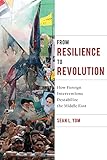From Resilience to Revolution : How Foreign Interventions Destabilize the Middle East / Sean Yom.
Material type: TextSeries: Columbia Studies in Middle East PoliticsPublisher: New York, NY : Columbia University Press, [2015]Copyright date: 2015Description: 1 online resource (312 p.) : 10 figuresContent type:
TextSeries: Columbia Studies in Middle East PoliticsPublisher: New York, NY : Columbia University Press, [2015]Copyright date: 2015Description: 1 online resource (312 p.) : 10 figuresContent type: - 9780231175647
- 9780231540278
- 956.05
- DS62.8 .Y66 2015
- online - DeGruyter
| Item type | Current library | Call number | URL | Status | Notes | Barcode | |
|---|---|---|---|---|---|---|---|
 eBook
eBook
|
Biblioteca "Angelicum" Pont. Univ. S.Tommaso d'Aquino Nuvola online | online - DeGruyter (Browse shelf(Opens below)) | Online access | Not for loan (Accesso limitato) | Accesso per gli utenti autorizzati / Access for authorized users | (dgr)9780231540278 |
Frontmatter -- Contents -- A Note on Transliteration and Interviews -- Acknowledgments -- 1. The Argument and the Cases -- 2. Coalitions, State-Building, and Geopolitical Mediation -- 3. Conflict and Compromise in Kuwait -- 4. Inclusion and Stability in a Populist Autocracy -- 5. Cliency and Coercion in Iran -- 6. Exclusionary Politics and the Revolutionary End -- 7. A Conflict Interrupted in Jordan -- 8. Recurrent Tensions and Tenuous Survival Under Hashemite Rule -- 9. The Geopolitical Origins of Durable Political Order -- Notes -- Bibliography -- Index
restricted access online access with authorization star
http://purl.org/coar/access_right/c_16ec
Based on comparative historical analyses of Iran, Jordan, and Kuwait, Sean L. Yom examines the foreign interventions, coalitional choices, and state outcomes that made the political regimes of the modern Middle East. A key text for foreign policy scholars, From Resilience to Revolution shows how outside interference can corrupt the most basic choices of governance: who to reward, who to punish, who to compensate, and who to manipulate.As colonial rule dissolved in the 1930s and 1950s, Middle Eastern autocrats constructed new political states to solidify their reigns, with varying results. Why did equally ambitious authoritarians meet such unequal fates? Yom ties the durability of Middle Eastern regimes to their geopolitical origins. At the dawn of the postcolonial era, many autocratic states had little support from their people and struggled to overcome widespread opposition. When foreign powers intervened to bolster these regimes, they unwittingly sabotaged the prospects for long-term stability by discouraging leaders from reaching out to their people and bargaining for mass support—early coalitional decisions that created repressive institutions and planted the seeds for future unrest. Only when they were secluded from larger geopolitical machinations did Middle Eastern regimes come to grips with their weaknesses and build broader coalitions.
Mode of access: Internet via World Wide Web.
In English.
Description based on online resource; title from PDF title page (publisher's Web site, viewed 20. Nov 2024)


